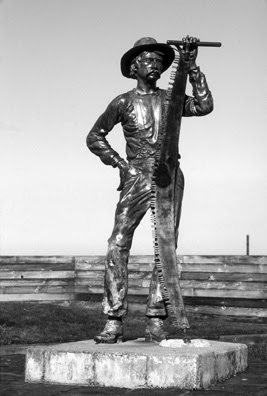
This post is both a life and a photographic topic. We all have seen the Henry David Thoreau quote, "Our life is frittered away by detail... simplify, simplify." Well, I'm believer in this logic and philosophy, find the easiest way to get what you want and get on with life. And sometimes it means making the decision to optimize your work or time, meaning it won't be perfect but something you can be satisfied with until you have the time or interest to work on it again.
I do this in my life, and I especially do this in my photography. I work to get the image I want in the field so I minimize what I do later in the computer. I occasionally work with an image to learn the tools and effects in Photoshop, but 80+% of my images are pretty much download or scan, import, make minor adjustments, size for the output, and get on to the next one. I almost always focus on one at a time but occasionally do a group for sizing after editing to simplify that process.
So,why the argument? Well, I read and hear a lot about all the work you can do in Photoshop to "fix" images. While I'm not against using Photoshop to produce an image you want to display or print artistically, but why for fixing something you should have done with the camera when you were standing there at the time taking the shot? This baffles me all the time because you can change settings and view the results so easily in digital or just shoot another shot with film. It's not that hard to simplify your thinking and work.
My point? Before you go to the photo work, think through it. What cameras do you need? What lenses? What equipment, such as flashes, and so on? I actually visually walk through it imagining myself there when I arrive and start. It's my mental check list. And before you turn the camera on, think through the work. Where are you? What is your goal and plan? What are the products for the images? What lenses do you need? Then think through the scene. What image format do you want to shoot? What camera settings will you test and use? Then just set the camera and plug in your eyes and brain and shoot away. And enjoy.
Take the fritter out of the work and simplify, simlify. How many tools did a lumberjack need when they were like the one in the statue, other than muscles? That's simplicity and focusing. Something to remember.

Having been at it for a while, I take it you're not discouraged by such a negative reaction. I can understand the reaction, as you can't expect everyone to be informed about your rights as a hobbyist. I think it's important for photographers to handle these encounters with sensitivity, as times are already quite sensitive. It sounds like you did, so congrats.
ReplyDeleteI'm generally not discouraged by negative reactions because I try to listen and see what's in and behind their views, and if there is something I can learn to improve my skills in photography. I actually learn from the diversity of people showimg me what I don't know or see, but there are some that doesn't resonate easily, and that takes a little more time. You also have to sort out criticism from opinion. Sometimes photographers assume the latter for the former, and because it is opinion, you have to learn to be diplomatic, something I don't always do well.
ReplyDelete